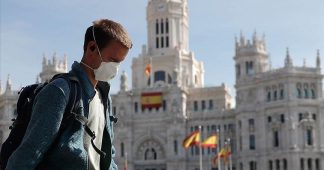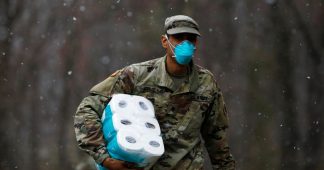By Berra Can
04.23.2020
I am constantly worried about my parents, who run a small pharmacy in Istanbul, Turkey. Technically, they qualify for the stay-at-home order that has been issued for individuals over 65 (and more recently for those under 20) during the COVID-19 pandemic, but as health workers they cannot stay home. They also need to work a few more years to be eligible for a pension that will help them afford to stay in the city. They do not exhibit the symptoms of social isolation shared by white collar people I know, but they are exhausted. My parents’ normal work day of ten or more hours is now lengthened by an extra hour of cleaning and disinfecting the pharmacy and themselves. The Pharmacists’ Association gave them protective apparel and visors free of charge, but they and their one employee only get one set each.
The first time during the pandemic that my parents had nöbet, a duty assigned to them every 40 days to stay open for 24 hours while other pharmacies in the neighborhood close from 7pm to 9am, was on April 10. This task is a vital source of income, but a grueling one in the best of times since after the sleepless night they have an additional work day ahead of them. They are usually good humored about it, joking about staple 2am purchases like sexual performance enhancers and morning after pills.
They were anxious this time, however, due to the uncertainties about additional duties that have been given to pharmacies. On the night of April 9, the government announced that pharmacies are now tasked with giving out masks free of charge (five masks per person for ten days). This order was a sudden change from a previous announcement that had banned pharmacies from selling masks and tasked post offices with distributing them (five masks per person for seven days). The masks were not delivered in time for the nöbet but at 10pm on Friday, April 10 the government announced a 48-hour curfew taking effect at midnight in 31 cities, including Istanbul. During the two-hour window between the announcement and the curfew, people rushed to the pharmacy to purchase essentials like baby food and adult diapers.
Health systems in countries with high rates of privatization, inequality and precarity are struggling to meet the challenges of the pandemic as governments shift responsibilities back and forth between different workers and institutions. Turkey is not the only country that has approached the COVID-19 pandemic with last-minute changes in regulations and a lack of transparency. In the United States, for example, the Centers for Disease Control and Prevention suddenly reversed its advice about wearing masks and there is little government coordination on importing personal protective equipment.
COVID-19 is disproportionately affecting already vulnerable populations. In Turkey that includes workers in the informal economy, refugees, women and those living in impoverished and polluted environments. The ruling Justice and Development Party (AKP) of President Recep Tayyip Erdoğan is also taking advantage of the crisis to curtail the power of democratically elected city officials.
Inequality Exacerbates the Pandemic
Turkey has recorded more than 86,000 people infected and over 2,000 deceased as of April 20, according to the World Health Organization. But there are questions about the accuracy of these numbers as many cases are coded as pneumonia and the availability of testing is uneven. In Ankara, tests on healthcare workers were immediately suspended when the first set of results came back positive for nine people. According to a journalist I spoke to, testing centers only exist in a handful of Kurdish cities, and the results are not publicly announced. He estimates that 300 cases have been confirmed in Diyarbakır, but information is not available for those who are treated in their homes.[1] A medical doctor in the smaller city of Dersim told me that she heard about six confirmed cases, although people have to travel to other city centers to get tested.[2] If the number of infected people grows, the doctor believes that lack of equipment in provincial hospitals could be a problem.
he disease is accentuating and exacerbating inequalities in Turkey, just as it is in other parts of the world. One of the badly hit cities is Zonguldak, which has a high number of respiratory diseases associated with its numerous coal plants. In Istanbul, working class neighborhoods like Esenler, Bağcılar and Bayrampaşa are disproportionately affected. In the absence of a nationwide lockdown, the social distancing and voluntary shelter-in-place measures are more easily observed by professionals and those in the middle and upper classes.
In response to recent mobilizations by major labor unions, however, the government is finalizing a ban on layoffs for three months. While this is an impressive measure, especially in comparison with the staggering 22 million plus unemployment claims filed in the United States since mid-March, the law leaves much to be desired. Among its problems is the unpaid leave policy, which will only give each worker a minimum wage of $5.75 (39 liras) per day. An economist who teaches in Istanbul pointed out that the law does not take into account the hundreds of thousands of informal workers who lack unions and will certainly be laid off from their jobs in service, transportation and construction, among other sectors.[3]
Refugees, many of whom lack work permits, unions and minimum wage conditions, are among those disproportionately affected by the loss of jobs in the informal economy. With increasing bans on intercity travel, refugees will lose an additional source of income in seasonal agricultural work.
For many, the choice is between working and taking the risk of possible infection, or staying home but going hungry. Women’s participation in uncompensated domestic and care work has increased since schools have closed and many women have lost their jobs in informal work such as cleaning. This situation highlights another way that the pandemic is intersecting with preexisting and systemic political and economic problems.
While staying at home is a luxury many cannot afford, the home is not always a safe space. The rates of violence against women are high in Turkey and, according to recent numbers from the Ministry of Interior, the overall rate of domestic violence has increased by 38.2 percent compared with last March. A feminist activist told me that women’s organizations are also worried about the prison reform bill that will release about one third of Turkey’s 300,000 prisoners into parole or house arrest.[4] The bill, which was approved on April 14, will bring much needed relief to vulnerable incarcerated populations. She noted, however, that since the Turkish Penal Code does not specifically address violence against women, there is “no mechanism to assess whether the attack, assault or injury was a form of violence against women.” Many perpetrators will thus be sent to the same houses where they may have abused their partners and family members. Shelters that offer relief to women at risk are closed in many areas. The provisions of the bill, moreover, do not apply to political prisoners such as politicians, journalists, students and lawyers, many of whom are being held without charges.
Political Parties Respond
In Diyarbakır and other Kurdish cities the pandemic has given Erdoğan’s ruling AKP party an excuse to replace democratically elected municipal representatives with government appointed trustees, further blurring already nebulous decision making mechanisms. According to the journalist I spoke to, this action is an example of the central government’s interference with the ability of citizens to connect with local and opposition parties. Kurdish cities, he says, have long been test laboratories for the types of curtailments that opposition-run municipalities are now experiencing in major cities like Istanbul, Ankara and Izmir after their successes in local elections last year. A clear expression of this disconnect was Istanbul mayor Ekrem Imamoğlu’s surprise on April 10 upon learning about the 48-hour curfew only two hours in advance—at the same time as the rest of the country.
While deliberation and transparency are lacking, efforts for solidarity continue. The People’s Democratic Party (HDP) identified 3,000 families who will benefit from a mutual aid program called the “sibling family campaign,” which includes food packages. When a deputy from the Ministry of Family, Labor and Social Services told a Roma woman in a tweet “to die” when she said she cannot obey the stay-at-home order because she needs to feed her family, widespread criticism resulted in his dismissal. On the other hand, in Van, a ban against protests that has been in effect since November 2016 was renewed for the month of April, despite the fact that many people are already in social isolation.
Government concerns with so-called security take precedence over the economy, which in turn is deemed more important than public health. As Erdoğan put it in late March: “Turkey is a country where production must continue and the cogs must keep turning under every circumstance and every condition.”
Health workers like my parents are in a precarious situation. But the relationships between public health, poverty, labor, racism and gender further complicate the trajectory of COVID-19 in places like Turkey, where the poor, the working classes and refugees continue to be the most vulnerable. The pandemic is an opportunity to question our consumption habits and our assumptions about growth and productivity. Since inequality produces poverty as well as public health and ecological problems, now is the time to think through alternatives, ranging from the nationalization of hospitals to the restoration of health to its rightful place among our commons, accessible to all.
Note: Berra Can is a pseudonym for an academic based outside of Turkey. Given the highly securitized nature of politics in Turkey at this time, they prefer to remain anonymous.
For further reading see the Middle East Report issue titled Confronting the New Turkey (Fall 2018). All the articles are freely accessible.
Endnotes
[1] Interview, April 10, 2020.
[2] Interview, April 11, 2020.
[3] Interview, April 10, 2020
[4] Interview, April 11, 2020











